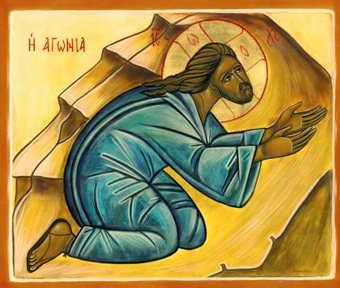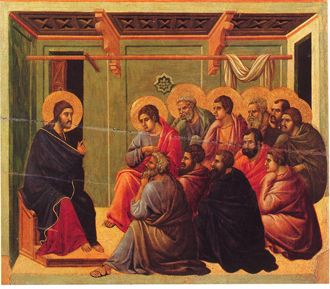For Sunday May 16, 2021
Lectionary Readings (Revised Common Lectionary, Year B)
Acts 1:15-17, 21-26
Psalm 1
1 John 5:9-13
John 17:6-19
For the seventh Sunday after Easter, the Revised Common Lectionary always gives us a portion of Jesus’s “High Priestly Prayer,” the culmination of his farewell discourse to his disciples. The setting is the Upper Room on Maundy Thursday. Jesus has just washed his disciples’ feet, foreseen Judas’s betrayal, predicted Peter’s denial, promised his disciples the Holy Spirit, and offered them urgent words of instruction. Time is running out, and Jesus knows it.
The atmosphere in the room, if we take the liberty of imagining it, is quiet, tender, anxious, pensive. Jesus is troubled, full of pain at the prospect of saying goodbye to his friends, and the ardor of his words and gestures is the ardor of a lover. Even as he knows that his life on earth is drawing to a close, he yearns to remain in communion with his beloved.
What would you do in such a moment, if you were Jesus? If separation loomed, if there was so much more you wanted to say and do, if the letting go felt like it would split your heart in two — what would you do?
Jesus prays. In the final moments before his goodbye, he “looks toward heaven and prays.” Can we pause for a moment, and consider how remarkable that is? That God prays?
I’ve heard some people call the high priestly prayer the “other” Lord’s Prayer — the one we don’t memorize and recite on Sunday mornings. It’s certainly not polished and poetic like the “Our Father.” It doesn’t flow, or cover its bases with anything like efficiency — it’s long, rambling, and rather hard to follow. And though the disciples are meant to overhear the words, Jesus’s tone has an urgency and passion to it that is achingly private. Jesus isn’t engaging in a teaching moment with this Lord’s Prayer; he’s rending his heart.
 |
“I am asking,” Jesus says. How surprising is it that God incarnate spends his final moments with his friends in humble supplication on their behalf? Knowing full well the trials and terrors that lie ahead, he prays into uncertainty. He hopes into doubt. He trusts into danger.
In an outpouring of words and emotions, Jesus asks God to do for his friends what he himself can no longer do. To be for them in spirit what he can no longer be for them in body. “Protect them,” Jesus prays. “Protect them by your name.” “Protect them from the evil one.” Protect them so that they can know unity, joy, and truth. Protect them.
Do you know this Jesus, the one who pleads so earnestly? Most of us know the Jesus who teaches, heals, resurrects, and feeds. But do we know this one? This vulnerable, tenderhearted lover who in this scripture passage does the single hardest thing a human being can do? He sends his cherished ones into a treacherous world on nothing but a hope and a prayer. He entrusts the treasures of his heart to the vast mystery that is intercession.
I am asking. As if to say: I don’t know what you will do with my asking. I don’t know how or when or if you will answer this prayer. I can't force your hand. But I am staking my life and the lives of my loved ones on your goodness, because there’s literally nothing more I can do on my own. I have come to the end of what this love of mine can hold and guard and save. I am asking.
 |
To wonder what role prayer plays in our world, a world rife with tragedy, illness, injustice, and oppression, is to raise the hardest questions I can think of about God — questions I don’t know how to answer. Does God intervene directly in human affairs? Does God’s intervention — or lack of it — depend in any way on our asking? Can prayer "change" God?
As has been the case in many areas of my faith life, my beliefs about prayer have changed a lot over the years. I was raised to believe that God intervenes very directly in human affairs, and that intercessory prayer has powerful and undeniable "real world" effects. As a child, I believed with all my heart that prayer heals diseases, prevents car accidents, feeds hungry children in far away countries, fends off nightmares, prevents premature death, and "stops the bad guys." As a teen and young adult, much of that certainty collapsed under the weight of life experience — some diseases didn't get better, car accidents happened, I had nightmares, babies starved, young people died, and "bad guys" won the day. When I asked my elders to explain these discrepancies, they gave me two answers: 1) You need to pray with more faith, and 2) Sometimes God's answer is no. Both answers struck me then — and strike me now — as painfully inadequate.
Today, I live along the borders of a more complicated world. I have friends and family members who pray for parking spots, lost house keys, Little League victories, and Ivy League admissions for their children. But I also have friends who avoid intercessory prayer on principle, convinced that the true purpose of prayer has nothing to do with asking God "for stuff." In their words: "He's God. Not Santa Claus."
The challenge of intercessory prayer is that it's subjective. What looks like God's "yes" in my eyes might easily look like God’s "no," God’s silence, or even God’s non-existence in yours. When is an "answer to prayer" really an answer? When is it coincidence? Randomness? A trick of the light? The cost of our liberty — a cost God daily chooses to endure — is that we can't say for sure. Not in this lifetime.
 |
So why do we pray? For me, one answer is that I pray because I am compelled to do so. Something in me cries out for engagement, relationship, attentiveness, and worship. I pray because my soul yearns for connection with an Other who is God, and that connection is best forged in prayer. With words, without words, through laughter, through tears, in hope, and in despair, prayer holds open the possibility that I am not alone, and that this broken world isn't alone, either. I pray, as C.S Lewis writes, "because I can't help myself." Because "the need flows out of me all the time — waking and sleeping."
That’s one answer. But maybe this week’s Gospel reading offers me another one: I pray because Jesus did. I pray because I love, and prayer is what lovers do. We ask. We stretch out with our requests and intercessions. We yearn with our prayers towards communion with the Source of all love, so that our human loves might be secured, strengthened, sustained, and sanctified.
I ask because Jesus asked. Asking is the last thing he did before his arrest. The last tender memory he gave his friends. He didn’t awe them with a grand finale of miracles. Neither did he contemplate their futures and despair. He looked up to heaven with a trembling heart, and surrendered his cherished ones to God.
Jesus asked because he loved. May we do likewise.
Debie Thomas: debie.thomas1@gmail.com
Image credits: (1) God & Life & Stuff; (2) Wikimedia.org; and (3) Milk & Honey.





